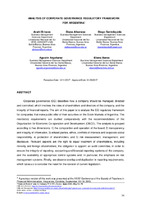Analysis of corporate governance regulatory framework for Argentina
Date
2018-02-01Author
Briozzo, Anahí E.
Albanese, Diana
Santolíquido, Diego
Argañaraz, Agustín
Barco, Eliana
Metadata
Show full item recordAbstract
Corporate governance (CG) describes how a company should be managed, directed and controlled, which involves the roles of shareholders and directors of the company, and the integrity of financial reports. The aim of this paper is to analyze the CG regulatory framework for firms that make public offer of their securities on the Stock Markets of Argentina. The mandatory requirements are studied comparatively with the recommendations of the Organization for Economic Co-operation and Development (OECD). The analysis is grouped according to five dimensions: 1) the composition and operation of the board, 2) transparency and integrity of information, 3) related parties, ethics, conflicts of interest and corporate social responsibility, 4) protection of shareholders, and 5) risk measurement, management, and disclosure. Relevant aspects are the right to equal treatment of shareholders, including minority and foreign shareholders; the obligation to appoint an audit committee, in order to ensure the integrity of reporting accounting and financial reporting systems of the company, and the availability of appropriate control systems and, in particular, the emphasis on risk management systems. Finally, we observe overlap and duplication in reporting requirements, which takes us to consider the need for the revision of current legislation.
Collections
- Revista Visión de Futuro [457]
The following license files are associated with this item:



